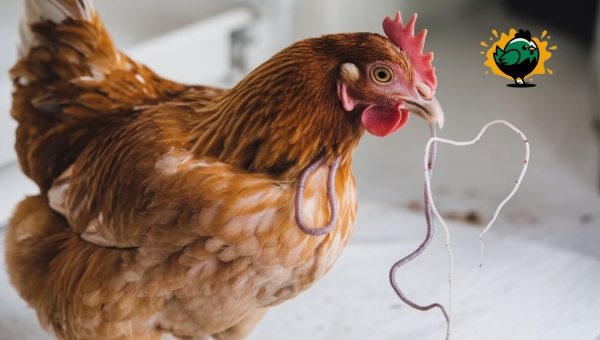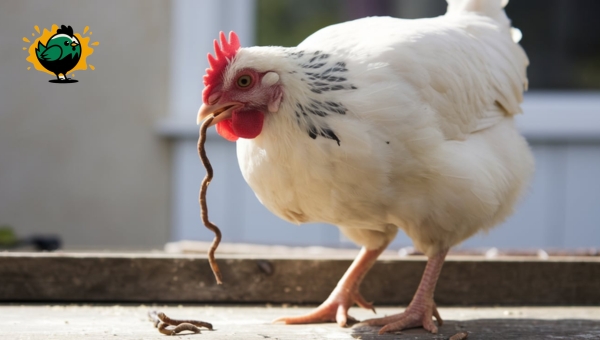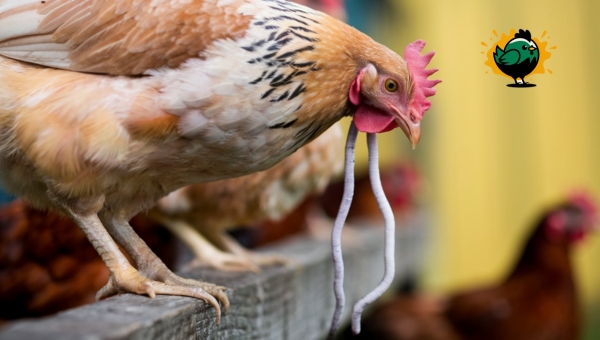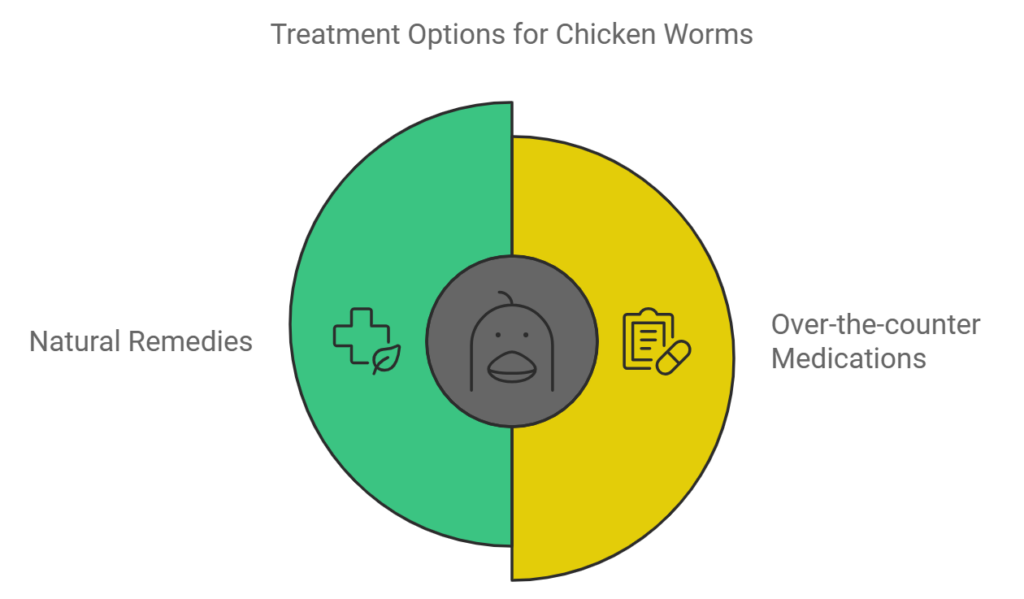Chicken Worms | Essential Guide to Healthy Poultry

Imagine waking up to find your beloved flock of chickens looking tired and under the weather. Their usual lively clucks are replaced by lethargic movements. This scenario could be due to chicken worms, a common issue faced by poultry keepers.
These tiny invaders can cause significant harm, leading to reduced egg production and poor health in chickens. Understanding and managing chicken worms is crucial for maintaining a thriving flock.
In this article, we’ll explore the types of chicken worms, how to recognize their symptoms, and the best ways to keep your chickens healthy and happy. Get ready to dive into the world of chicken care!
Understanding Chicken Worms
Chicken worms are internal parasites that affect poultry health, often found in environments where cleanliness is lacking. Common types include roundworms, hairworms, tapeworms, and caecal worms. These parasites live in the chicken’s intestines or other parts of the digestive system.

Infected chickens might show signs like weight loss, decreased egg production, and a general decline in health. Worm infestations can disrupt nutrient absorption, making it essential for poultry owners to address these issues swiftly.
Regular check-ups and proper treatment methods are crucial to maintaining a healthy flock. By understanding the life cycle and impact of these parasites, chicken keepers can take proactive steps to prevent severe infestations and safeguard the productivity of their birds.
Types of Chicken Worms
Understanding the types of chicken worms is essential for maintaining healthy poultry.

Here’s a breakdown:
- Roundworms (Ascaridia galli): These are the most common, usually residing in the small intestine.
- Hairworms (Capillaria spp.): Thin and thread-like, they inhabit the crop or intestines.
- Caecal Worms (Heterakis gallinarum): Generally found in the ceca and often harmless, but they can transmit diseases.
- Tapeworms: Recognizable by their segmented appearance, they are typically located in the upper small intestine.
Recognizing these types can help in managing and preventing worm infestations in your flock.
Also Read: Black Copper Maran-The Best Guide to This Unique Chicken
Symptoms of Worm Infestation
Understanding the symptoms of worm infestations in chickens is essential for maintaining a healthy flock. Early detection can prevent severe health issues and improve the overall well-being of your birds.
By identifying the common signs, you can take prompt action to address the problem effectively. Below, we delve into these symptoms to help you recognize and manage worm infestations.
Recognizing Signs
Detecting worm infestations involves observing a variety of symptoms in chickens, such as:
- Weight loss: Chickens may appear thinner despite normal feeding.
- Reduced appetite: Birds show less interest in food.
- Pale comb and wattles: A noticeable lack of color in these areas.
- Diarrhea: Unusual droppings can indicate a problem.
- Ruffled feathers: Feathers may appear untidy or fluffed up.
- Lethargy: A decrease in normal activity levels.
- Reduced egg production: Fewer eggs than usual.
Diagnosing Chicken Worms
Identifying chicken worms early is essential for maintaining a healthy flock. There are two primary methods to diagnose these parasites. Physical examinations help detect signs of infestation, while fecal testing provides a more precise diagnosis. Let’s delve into these two approaches.

Physical Examination
A physical examination is an effective way to spot potential worm infestations in chickens. By checking the bird’s overall condition, one can notice signs such as:
- Weight loss
- Unusual droppings
- General weakness
These observations can indicate the presence of worms, prompting further investigation.
Fecal Testing
Fecal testing offers a definitive method to diagnose worm infestations. The process involves:
- Collecting a fresh fecal sample from the chicken.
- Analyzing the sample in a laboratory to detect worm eggs.
- Identifying the specific type of worms affecting the flock.
This method ensures accurate results and helps in choosing the appropriate treatment.
Also Read: Top Rare Chicken Breeds | A Must-See for Enthusiasts
Treatment Options
Addressing chicken worms involves choosing appropriate treatment options. It’s crucial to understand the different methods available to tackle these parasites effectively.
Over-the-counter medications offer a straightforward approach, while natural remedies provide alternative solutions. Understanding both can help in managing worm issues in your flock.

Over-the-counter Medications
Over-the-counter medications are readily available for treating chicken worms. They include:
- Piperazine: Commonly used for targeting roundworms.
- Fenbendazole: Effective against a variety of worms, including caecal worms.
- Levamisole: Often used in poultry for broad-spectrum worm control.
These medications are generally easy to administer and can significantly improve the health of your chickens when used correctly.
Natural Remedies
Natural remedies can also be considered for managing chicken worms. Some popular alternatives include:
- Garlic: Known for its natural anti-parasitic properties.
- Diatomaceous Earth: A natural product that can be added to feed.
- Pumpkin Seeds: Contains compounds that may help in expelling worms.
While these remedies can be beneficial, they should be used alongside conventional treatments for optimal results.
Preventive Measures
When it comes to ensuring your chickens remain healthy and free from worms, preventive measures are key. Proper cleanliness and regular health checks are two fundamental strategies that can greatly reduce the risk of infestations.
By focusing on these areas, chicken keepers can maintain a healthy environment for their flock, staving off potential problems before they arise.
Cleanliness and Hygiene
Maintaining a clean environment is essential in preventing chicken worm infestations. Here are some practices to consider:
- Regularly clean chicken coops to remove droppings and other debris.
- Ensure that feed and water sources are clean and free from contamination.
- Rotate grazing areas to minimize contact with contaminated soil.
Regular Health Checks
Frequent health checks are important for the early detection of worm issues. Here are some steps to follow:
- Observe your chickens daily for any signs of illness or unusual behavior.
- Schedule regular veterinary visits for professional assessments.
- Keep detailed records of each chicken’s health status and any treatments administered.
Conclusion
Understanding chicken worms is essential for maintaining a healthy flock. These parasites can cause significant health issues, affecting poultry productivity and overall well-being. By recognizing symptoms, employing appropriate diagnostic methods, and choosing effective treatments, chicken owners can manage and prevent infestations.
Moreover, maintaining cleanliness and regular health checks are crucial preventive measures. In summary, staying informed and proactive is key to safeguarding your chickens from these pesky parasites. If you found this information helpful, explore more insightful articles on our site and empower yourself with the knowledge to keep your flock thriving!
